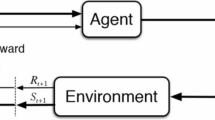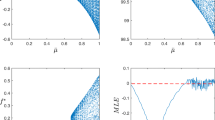Abstract
It is well known that empirical financial time series data exhibit long memory phenomena: the behaviour of the market at various times in the past continues to exert an influence in the present. One explanation for these phenomena is that they result from a process of social learning in which poorly performing agents switch their strategy to that of other agents who appear to be more successful. We test this explanation using an agent-based model and we find that the stability of the model is directly related to the dynamics of the learning process; models in which learning converges to a stationary steady state fail to produce realistic time series data. In contrast, models in which learning leads to dynamic switching behaviour in the steady state are able to reproduce the long memory phenomena. We demonstrate that a model which incorporates contrarian trading strategies results in more dynamic behaviour in steady state, and hence is able to produce more realistic results.
Access this chapter
Tax calculation will be finalised at checkout
Purchases are for personal use only
Preview
Unable to display preview. Download preview PDF.
Similar content being viewed by others
References
Cont, R.: Empirical Properties of Asset Returns: Stylised Facts and Statistical Issues. Quantitative Finance 1, 223–236 (2001)
Cont, R.: An Anatomy of Trading Strategies. The Review of Financial Studies 11(3), 489–519 (1998)
Ding, Z., Granger, C.W.J., Engle, R.F.: A Long Memory Property of Stock Market Returns and a New Model. Journal of Empirical Finance 1, 83–106 (1993)
Engle, R.F.: Autoregressive Conditional Heteroskedasticity with Estimates of the Variance of United Kingdom Inflation. Econometrica 50, 987–1008 (1982)
Evans, G.W., Honkapohja, S.: Learning and Expectations in Macroeconomics. Princeton University Press (2001)
Heemeijer, P., Hommes, C.H., Sonnemans, J., Tuinstra, J.: Forming Price Expectations in Positive and Negative Feedback Systems. Technical Report 04-15, Universiteit van Amsterdam (2004)
Lamoureux, C.G., Lastrapes, W.D.: Heteroskedasticity in Stock Return Data: Volume Versus GARCH Effects. Journal of Finance 45(1), 221–229 (1990)
LeBaron, B., Yamamoto, R.: Long-memory in an Order-Driven Market. Physica A 383, 85–89 (2007)
LeBaron, B., Yamamoto, R.: The Impact of Imitation on Long-Memory in an Order Driven Market. Eastern Economic Journal 34, 504–517 (2008)
Lillo, F., Mike, S., Farmer, J.D.: Theory for Long Memory in Supply and Demand. Physical Review E 7106, 287–297 (2005)
Lo, A.W.: Long-Term Memory in Stock Market Prices. Econometrica 59, 1279–1314 (1991)
Lobato, I., Velasco, C.: Long Memory in Stock-Market Trading Volume. Business and Economic Statistics 18(4), 410–426 (2000)
Mantegna, R.N., Stanley, E.H.: Stock Market Dynamics and Turbulence: Parallel Analysis of Fluctuation Phenomena. Physica A 239(1-3), 255–266 (1997)
Mantegna, R.N., Stanley, E.H.: Scaling Behavior in the Dynamics of an Economic Index. Nature 376, 46–49 (2002)
Pagan, A.: The Econometrics of Financial Markets. Journal of Empirical Finance 3(1), 15–102 (1996)
Author information
Authors and Affiliations
Editor information
Editors and Affiliations
Rights and permissions
Copyright information
© 2013 Springer-Verlag Berlin Heidelberg
About this paper
Cite this paper
Rayner, N., Phelps, S., Constantinou, N. (2013). Testing Adaptive Expectations Models of a Continuous Double Auction Market against Empirical Facts. In: David, E., Robu, V., Shehory, O., Stein, S., Symeonidis, A. (eds) Agent-Mediated Electronic Commerce. Designing Trading Strategies and Mechanisms for Electronic Markets. AMEC TADA 2011 2011. Lecture Notes in Business Information Processing, vol 119. Springer, Berlin, Heidelberg. https://doi.org/10.1007/978-3-642-34889-1_4
Download citation
DOI: https://doi.org/10.1007/978-3-642-34889-1_4
Publisher Name: Springer, Berlin, Heidelberg
Print ISBN: 978-3-642-34888-4
Online ISBN: 978-3-642-34889-1
eBook Packages: Computer ScienceComputer Science (R0)




